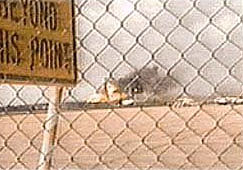 The hot noonday sun baked the large crowd assembled in the country graveyard. I could feel swear running down my face as Bob’s casket pulled hard at my tired arms. I looked at the other five pallbearers and saw they were struggling just as much as I was. The big metal box was heavy. Probably from Bob’s big heart.
The hot noonday sun baked the large crowd assembled in the country graveyard. I could feel swear running down my face as Bob’s casket pulled hard at my tired arms. I looked at the other five pallbearers and saw they were struggling just as much as I was. The big metal box was heavy. Probably from Bob’s big heart.
But I have a feeling we were struggling from something much deeper than the weight of the casket.
If I had to get up and describe Bob’s life, I really don’t know where I’d start. Maybe it would be on July 19, 1989. Bob was on United Airlines Flight 232. That may not mean much to you; it has been awhile since it was the lead story on the Nightly News. Flight 232 was the DC-10 that crashed in Sioux City, Iowa. It wasn’t Bob’s time to go but unfortunately it was 111 others’. Bob was one of the 185 people who stumbled out of the wreckage. He emerged from the flames and corn a different man. When his life flashed before his eyes, he didn’t much care for what he saw.
Bob and his wife Suzanne moved to my town soon after that and he changed his whole life. Tumbling down the runway and the following fire forged him like steel. He developed a sense of urgency that day. Bob became a man of action.
He knew exactly how precious life is. And how fleeting it can be.
Five years ago, he lost Suzanne to Ovarian Cancer. He would argue about the term “lost” — he liked to tell people he was only temporarily separated from her. That’s how Bob rolled. Put a half-empty glass on the table and he’d correct you by saying, “It’s half full.”
Bob wasn’t a Pollyanna-ish kind of guy, though. Oh, no. Not Bob. He knew pain. The burn scars on his back were a constant reminder of how life could be cruel. I wish Bob had met Viktor Frankl. Frankl was the Holocaust survivor whose book Man’s Search for Meaning guided Bob’s life. Bob would come over while I was cutting grass, bringing me a cold beverage and say, “It’s not what happens to you. It’s how you react to it.”
That was Bob. Thinking of others first. There wasn’t a selfish bone in the man’s body.
“It’s the secret to life,” he’d say. “Become the best you can be and then turn around and give your best to others.”
I’m really going to miss Bob.
Bob was like bacon. He made everything better. Of course, he’d joke, “I clog hearts?” No, Bob made hearts stronger.
We were sitting on my front porch on late August afternoon. I had lost my job and he just sat there and rocked. After ten minutes of silence, he looked at me and said, “You can’t build on what you’ve lost. You have to focus on what you have left and move on from there.” It was hard to have a pity party around Bob.
He made others want to be better. He “leaned in” and “paid forward” before it became popular.
Today we’re carrying Bob to the grave. Giant shoes are being left behind. Giant empty shoes. I feel like I’ve lost a part of me. But Bob would disagree. He say, “You’re only temporarily separated from me.”
As soon as we cover his casket, I have big shoes to fill.
Because my friend Bob truly lived as Mark Twain once said, “Let us endeavor so to live that when we come to die even the undertaker will be sorry.”
See you soon Bob.
